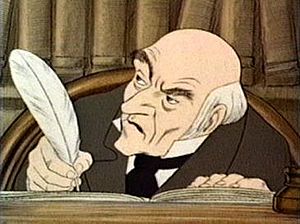A Christmas Carol (TV special) facts for kids
Quick facts for kids A Christmas Carol |
|
|---|---|

Ebenezer Scrooge
|
|
| Directed by | Richard Williams |
| Produced by | Richard Williams Chuck Jones |
| Written by | Charles Dickens |
| Narrated by | Michael Redgrave |
| Starring | Alastair Sim Michael Hordern Diana Quick Joan Sims |
| Music by | Tristram Cary |
| Distributed by | American Broadcasting Company |
| Release date(s) | December 21, 1971 |
| Running time | 25 minutes |
| Country | United States |
| Language | English |
A Christmas Carol is a classic animated film from America. It is based on the famous 1843 story by Charles Dickens called A Christmas Carol. This short film first aired on U.S. television on December 21, 1971, on ABC. Later, it was shown in movie theaters. In 1972, the film won a special award: the Academy Award for Best Animated Short Film.
About the Film
This animated movie brings the beloved tale of Ebenezer Scrooge to life. It tells the story of a grumpy old man who learns about the true meaning of Christmas. Three ghosts visit him on Christmas Eve. They show him his past, present, and future.
Who's Who in the Voices?
Many talented actors lent their voices to the characters in A Christmas Carol. Voice actors help bring animated characters to life. They use their voices to show emotions and personalities.
- Alastair Sim as Ebenezer Scrooge
- Michael Redgrave as Narrator
- Michael Hordern as Marley's Ghost
- Diana Quick as Ghost of Christmas Past
- Joan Sims as Mrs. Cratchit
- Paul Whitsun-Jones as Ragpicker/Fezziwig
- David Tate as Fred/Charity Man
- Felix Felton as Ghost of Christmas Present
- Annie West as Ghost of Christmas Yet to Come
- Melvyn Hayes as Bob Cratchit
- Mary Ellen Ray as Mrs. Dilber
- Alexander Williams as Tiny Tim (uncredited)
The Unique Look of the Film
This version of A Christmas Carol has a very special visual style. The animators used clever camera movements, like zooms and pans. They also created smooth, surprising scene changes.
The film's look was inspired by old drawings. These include 19th-century pictures by John Leech. He illustrated Dickens' original book. It also took ideas from Milo Winter's pen and ink drawings from the 1930s.
The movie has a serious and dramatic feel. It uses a lot of shadows and dark scenes. This makes it quite intense and powerful. Because of its dramatic mood, it is best for older kids and teens, rather than very young children.
Winning an Oscar!
A Christmas Carol was first made as a TV special in 1971. But it was so well-made that it was later shown in movie theaters. This made it eligible to win an Academy Award.
The film went on to win the Academy Award for Best Animated Short Film in 1972. This is a very big honor in the film industry. Some people in the movie business thought it was unusual for a TV show to win an Oscar. Because of this, the Academy changed its rules. They decided that future films first shown on TV could not win an Oscar.

